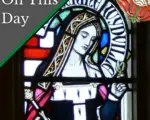
On this day in Tudor history, 18th May 1497, Catherine Woodville, Duchess of Buckingham and Bedford, died.
Who was Catherine Woodville and how was she linked to the famous Woodvilles who rose in the reign of King Edward IV?
[Read More...]
On this day in Tudor history, 18th May 1497, Catherine Woodville, Duchess of Buckingham and Bedford, died.
Who was Catherine Woodville and how was she linked to the famous Woodvilles who rose in the reign of King Edward IV?
[Read More...]
On this day in Tudor history, 11th April 1554, in the reign of the Catholic Queen Mary I, Sir Thomas Wyatt the Younger, son of poet and diplomat Sir Thomas Wyatt the Elder, was beheaded on Tower Hill after being found guilty of high treason.
Wyatt had led a rebellion which sought to depose the queen and to replace her with her half-sister Elizabeth, but he refused to implicate Elizabeth in the plot. He went to his death asserting her innocence.
Find out more about what happened and hear his final speech…
[Read More...]
On this day in Tudor history, 26th January 1546, judge of assize and law reporter, Sir John Spelman, died.
Now, you may never have heard of Justice John Spelman, but his reports on the legal cases of people like Queen Anne Boleyn, Sir Thomas More, Bishop John Fisher and Cardinal Thomas Wolsey have been very useful to historians – a wonderful resource.
Find out more about Sir John Spelman and what he had to say about Anne Boleyn’s trial in this video…
[Read More...]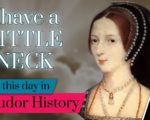
On this day in Tudor history, 18th May 1536, Queen Anne Boleyn’s execution was postponed.
Sir William Kingston, the Constable of the Tower of London, was surprised by the queen’s reaction when he informed her of the delay – why? How did Anne react? What did she say?
Find out exactly what Anne Boleyn said…
[Read More...]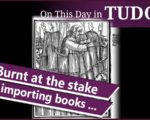
On this day in Tudor history, 27th November 1531, former Benedictine monk and reformist, Richard Bayfield, was burnt at the stake at Smithfield for heresy after Sir Thomas More had caught him importing heretical books into England.
It wasn’t Bayfield’s first brush with the authorities. He’d been in trouble for heresy previously so was now deemed a “relapsed heretic”. This time, penance wasn’t enough, he was condemned to death.
Find out more about Richard Bayfield, how he went from being a monk to a reformer, and how he ended up at the stake as a Protestant martyr. I also share John Foxe’s account of Bayfield’s burning.
[Read More...]
On this day in Tudor history, 16th November 1601, nobleman and rebel Charles Neville, 6th Earl of Westmorland, died while in exile at Nieuwpoort in Flanders.
Westmorland had fled into exile following the failure of the Northern Rebellion, a plot to release Mary, Queen of Scots, from prison and to overthrow Elizabeth I. He didn’t learn his lesson, being involved in a further plot.
The earl died a sad end in debt and separated from his wife and daughters, but it was his own fault.
Find out more about the rebel northern earl in today’s talk.
[Read More...]
On this day in Tudor history, 31st October 1537, Lord Thomas Howard, second son of Thomas Howard, 2nd Duke of Norfolk, died while imprisoned in the Tower of London. He was about twenty-five years of age at his death.
How did this son of the 2nd Duke of Norfolk and brother of the 3rd Duke of Norfolk end up dying in the Tower?
Well, he fell in love with the wrong woman? He had become secretly betrothed to King Henry VIII’s niece, Lady Margaret Douglas.
Find out more about Lord Thomas Howard, his relationship with Lady Margaret Douglas, and what happened to them both, in today’s talk. Oh, and Margaret really didn’t learn her lesson!
[Read More...]
On this day in Tudor history, 26th October 1536, the rebels of the Pilgrimage of Grace halted at Scawsby Leys near Doncaster, where they met crown troops. The rebels were said to number around 30,000 and the crown’s army was only a fifth of the size, but the rebel leader, lawyer Robert Aske, chose to negotiate rather than fight.
Why, when they could well have won?
Well one Tudor chronicler puts it down to rain. You can find out more about this meeting, how rain put a stop to the rebels’ plans, and what happened next between the Pilgrimage of Grace rebels and Henry VIII, in today’s talk.
[Read More...]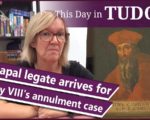
On this day in Tudor history, 29th September 1528, the papal legate, Cardinal Lorenzo Campeggio, landed at Dover on the Kent coast.
Campeggio and Cardinal Thomas Wolsey, who had been appointed the pope’s vice-regent, were given the task of hearing Henry VIII’s case for an annulment of his marriage to Catherine of Aragon.
Find out more about what happened when next, what happened at the special legatine court, and how Henry ended up waiting for his annulment for a few more years, in today’s talk.
[Read More...]
On this day in Tudor history, 25th September 1525, explorer, navigator and naval administrator Stephen Borough (Burrough) was born at Borough House, Northam Burrows, Northam, in Devon.
This Arctic explorer learnt his navigational skills from first his uncle and then Spanish pilots in Seville. He discovered Novaya Zemlya and the Viagatz Strait (Kara Strait), which was named the Burrough Strait until the late 1800s.
Hear an overview of Stephen Borough’s life and career in today’s talk.
[Read More...]
On this day in Tudor history, 4th September 1539, William, Duke of Cleves, signed the marriage treaty promising his sister, Anne of Cleves, in marriage to King Henry VIII.
Anne would of course become Henry VIII’s fourth wife.
Find out all about the marriage agreement and its terms, and what happened next, in today’s talk.
[Read More...]
On this day in Tudor history, 10th August 1553, the same day that Queen Mary I held requiem mass for the soul of her late half-brother, Edward VI, seven men died at London Bridge. They were drowned.
Find out more about what happened to these men – one of whom was Thomas Brydges, the son of Sir Thomas Brydges, Deputy Lieutenant of the Tower of London – how the Thames was the preferred way of travelling around London, and how and why it could be dangerous around London Bridge, in today’s talk.
[Read More...]
On this day in Tudor history, 17th March 1565, Scottish theologian and Reformer Alexander Alesius (also known as Ales, Aless), died in either Leipzig or Edinburgh.
Alesius wrote a huge number of theological works, was friends with reformers Philip Melancthon and Thomas Cranmer, Archbishop of Canterbury, but had a row with the Bishop of London at one point.
Let me tell you a bit more about Alexander Alesius and also a terrifying vision or nightmare he experience in the early hours of 19th May 1536, the day of Queen Anne Boleyn’s execution.
[Read More...]
On this day in Tudor history, 26th January 1546, judge of assize and law reporter, Sir John Spelman, died.
Now, you may never have heard of Justice John Spelman, but his reports on the legal cases of people like Queen Anne Boleyn, Sir Thomas More, Bishop John Fisher and Cardinal Thomas Wolsey have been very useful to historians – a wonderful resource.
Let me tell you more about Sir John Spelman and what he had to say about Anne Boleyn’s trial.
[Read More...]
25th January is the Feast of the Conversion of St Paul, an important day in Tudor times. It celebrated the conversion of Saul, a man known for his persecution of Christians, on the road to Damascus.
In today’s talk, I explain the background of the feast day and shares a contemporary account of how St Paul’s Day was celebrated in the reign of Queen Mary I.
[Read More...]
On this day in Tudor history, 17th January 1541, courtier, diplomat and poet, Sir Thomas Wyatt the Elder, was arrested and sent to the Tower of London after being accused of corresponding with Cardinal Reginald Pole, and referring to the prospect of Henry VIII’s death.
Wyatt was taken to the Tower and it looked like he’d be executed, but he was saved by Queen Catherine Howard, but at a huge cost.
Find out more about what Wyatt was accused of, how he escaped execution and what he had to agree to, in today’s talk.
[Read More...]
On this day in Tudor history, 2nd January 1536, imperial ambassador, Eustace Chapuys, visited his good friend, Catherine of Aragon, first wife of King Henry VIII and a woman who was now officially called the Dowager Princess of Wales.
Catherine was seriously ill, in fact, she was dying, and this would be the last time that Chapuys saw her.
Find out from Chapuys’ own account what happened in the four days he spent with Catherine of Aragon.
[Read More...]
On this day in Tudor history, 27th November 1582, eighteen year-old William Shakespeare, the famous playwright and a man known as the Bard, married twenty-six year-old Anne (also known as Agnes) Hathaway, at Temple Grafton, near Stratford-upon-Avon, in Warwickshire.
Anne Hathaway was pregnant at the time of their marriage and went on to give birth to a daughter, Susannah, the following May. The couple went on to have twins, Hamnet and Judith, in 1585.
Find out more about William Shakespeare and Anne Hathaway, and their marriage, and also what happened to them, in today’s talk:
[Read More...]
On this day in Tudor history, 19th November 1587, Henry Vaux died of what was probably consumption at Great Ashby, the home of his sister, Eleanor Brooksby.
Henry Vaux is a fascinating Tudor man. He started out as a precocious child and poet, and grew up to be an important member of the Catholic underground. He was a Catholic recusant and priest harbourer, helping Jesuit priests in the Protestant reign of Queen Elizabeth I, both financially and by giving them a roof over the heads.
In today’s talk, I introduce Henry Vaux and what happened to him in Queen Elizabeth I’s reign.
Book Recommendation: One of my very favourite history books is “God’s Traitors: Terror and Faith in Elizabethan England” by Jessie Childs.
[Read More...]
On this day in history, 16th November 1612, Elizabethan conspirator, William Stafford, died. He’s an interesting Tudor character because he had Plantagenet blood and also because he was allegedly the chief plotter in the Stafford Plot, a plot to assassinate Queen Elizabeth I, but he was only imprisoned for a short time and lived the rest of his life quietly in Norfolk, dying a natural death.
How and why did William Stafford escape serious punishment for the Stafford Plot and what did Sir Francis Walsingham have to do with it all?
Find out about William Stafford and the Stafford Plot in today’s talk.
[Read More...]
On this day in Tudor history, 31st October 1517, Reformer, priest and professor of theology Martin Luther is said to have posted his 95 Theses on the door of the Castle Church in Wittenberg, although all we know for definite is that he posted them to Bishop of Brandenburg and the Archbishop of Mainz.
The proper title of his work was the “Disputation of Martin Luther on the Power and Efficacy of Indulgences”, and he was protesting against the sale of indulgences by the papacy, as well as other points. His actions on this day had a huge impact on Europe and were the catalyst of the European Reformation.
Find out more about Martin Luther’s 95 Theses and what happened next in today’s video.
[Read More...]
On this day in Tudor history, 26th October 1529, Sir Thomas More took his oath as Lord Chancellor, replacing Cardinal Thomas Wolsey who was charged with praemunire.
It was an important day for Sir Thomas More, who was described as “an upright and learned man”, but, little did he know that his loyal service to the king would lead to his undoing.
Find out all about this day in 1529 in today’s talk.
[Read More...]

On this day in Tudor history, 29th September 1564, Michaelmas, the queen’s favourite, Robert Dudley, was made Earl of Leicester and Baron Denbigh in front of the Scottish ambassador, Sir James Melville.
Elizabeth I made Dudley an earl so that he’d be suitable as a potential bridegroom for Mary, Queen of Scots, but she couldn’t refrain from a display of affection during the ceremony, tickling him on the neck!
In today’s talk, I explain why Elizabeth I was prepared to marry her favourite off to Mary, Queen of Scots, what happened on this day in 1564, and what happened next.
[Read More...]
On this day in Tudor history, 25th September 1534, Pope Clement VII (Giulio di Giuliano de’ Medici) died in Rome. It was rumoured that he died from eating death cap mushrooms or from fumes from poisoned candles placed in his room, but it was more likely to have been from natural causes.
In today’s video, I introduce this pope, who was the leader of the Catholic Church at rather an interesting time, and also look at the rumours surrounding his death and what eating a death cap mushroom does. Lovely stuff!
[Read More...]
On this day in Tudor history, 18th September 1544, Henry VIII rode triumphantly through the streets of Boulogne after the French surrendered it to him.
This English victory came after the first siege of Boulogne of 1544 which saw the town “sore assaulted and so besieged with such abundance of great ordinance that never was there a more valianter assault made”.
The French surrendered Boulogne on 13th September 1544 and King Henry VIII entered it and was given its keys by his good friend, Charles Brandon, Duke of Suffolk, on 18th September. England was victorious but his ally, the Holy Roman Emperor, wasn’t behaving himself.
Find out more in today’s talk.
[Read More...]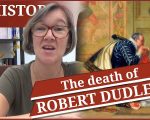
On this day in Tudor history, 4th September 1588, Robert Dudley, Earl of Leicester, died at Cornbury while on his way to Buxton to take the waters for his health.
The death of her favourite, and the man that is considered to be her ‘true love’, was a devastating blow to Elizabeth I and her reaction to the news shows just how much she loved her “sweet Robin”.
Leicester wrote to his queen just days before his death and “His Last Letter” was something that Elizabeth I treasured for the rest of her life.
Find out more about Leicester’s death, his last letter and Elizabeth’s grief in today’s video.
[Read More...]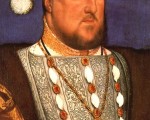
On this day in Tudor history, 23rd May 1533, in the reign of King Henry VIII, Archbishop Thomas Cranmer, declared the sentence of the special court that had met at Dunstable Priory in Bedfordshire.
The Dunstable Priory court had convened to hear the case for the annulment of King Henry VIII’s marriage to his first wife, Catherine of Aragon. Predictably, the court declared the marriage to be contrary to God’s laws and the archbishop was able to inform the king of the sentence of “divorce”.
Find out more in today’s video.
[Read More...]